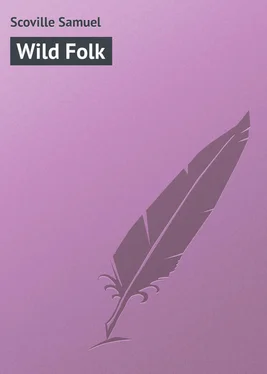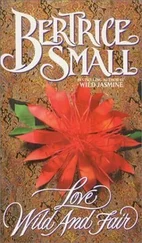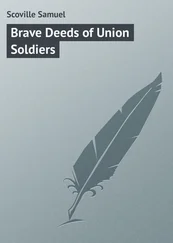Samuel Scoville - Wild Folk
Здесь есть возможность читать онлайн «Samuel Scoville - Wild Folk» — ознакомительный отрывок электронной книги совершенно бесплатно, а после прочтения отрывка купить полную версию. В некоторых случаях можно слушать аудио, скачать через торрент в формате fb2 и присутствует краткое содержание. Жанр: Природа и животные, foreign_prose, foreign_humor, Анекдоты, на английском языке. Описание произведения, (предисловие) а так же отзывы посетителей доступны на портале библиотеки ЛибКат.
- Название:Wild Folk
- Автор:
- Жанр:
- Год:неизвестен
- ISBN:нет данных
- Рейтинг книги:3 / 5. Голосов: 1
-
Избранное:Добавить в избранное
- Отзывы:
-
Ваша оценка:
- 60
- 1
- 2
- 3
- 4
- 5
Wild Folk: краткое содержание, описание и аннотация
Предлагаем к чтению аннотацию, описание, краткое содержание или предисловие (зависит от того, что написал сам автор книги «Wild Folk»). Если вы не нашли необходимую информацию о книге — напишите в комментариях, мы постараемся отыскать её.
Wild Folk — читать онлайн ознакомительный отрывок
Ниже представлен текст книги, разбитый по страницам. Система сохранения места последней прочитанной страницы, позволяет с удобством читать онлайн бесплатно книгу «Wild Folk», без необходимости каждый раз заново искать на чём Вы остановились. Поставьте закладку, и сможете в любой момент перейти на страницу, на которой закончили чтение.
Интервал:
Закладка:
The raccoon recovered his wind and, wily fighter that he was, changed his tactics. Without giving the dogs time to get back their lost courage, he suddenly dashed forward with a grating, terrifying snarl, the first sound that had come from him throughout the battle. As he rushed at them, his hair bristled until he seemed to swell to double his size.
For a second the ring held. Then with a yelp the nearest dog dived out of the way and scuttled off. His example was too much for the others. A second more, and the ring was broken and the dogs scattered. In vain the men tried to rally them again. They had resolved to have no further part or lot with that coon, who, without a backward look, moved stiffly and limpingly toward the nearest thicket.
Not until he had plunged into a tangle of greenbrier, where no dog could follow, did that pack recover its morale. Then indeed, safe outside the fierce thorns, they growled and barked and raved and told of the terrible things they would do to that coon – when they caught him.
Half an hour later, and half a league farther, from a great gum tree on the edge of a black silent stream, came the sound of soft, welcoming love-notes.
Father Coon was home again.
II
BLACKBEAR
It was the high-water slack of summer. Up on Seven Mountains the woods were waves of deep lush green; and in the hot September sunshine the birds sang again, now that the moulting-moon of August had set. Yet there was an expectancy in the soft air. Shrill, sweet insect-notes, unheard before, multiplied. When the trees and the grass were all dappled with patches of dark and moonshine, the still air throbbed with the pulsing notes of the white tree-crickets; while above their range the high lilt of their black brethren thrilled without a pause, the unnoticed background of all other night-notes. From the bushes, which dripped moonlight in the clearings, a harsh voice occasionally said, solemnly, “Katy did !” A week later, all the open spaces on the fringe of the woods would be strident with the clicking choruses of the main host of the filmy green, long-winged insects, of which these stragglers were but the advance-guard.
One morning, from the emerald-green of a swamp maple, a single branch flamed out a crimson-red. The ebb of the year had begun. As the days shortened, imperceptibly the air became golden, and tasted of frost. Then through the lengthening nights the frost-fires began to blaze. The swamp maples deepened to a copper-red and ended a yolk-yellow. On the uplands, the sugar maples were all peach-red and yellow-ochre, and the antlers of the staghorn sumac were badged with old-gold and dragon’s-blood red. The towering white ashes were vinous-purple, with an overlying bloom of slaty-violet, shading to a bronze-yellow. The scented trefoil leaves of the sassafras were all buttercup-yellow and peach-red, and the sturdy oaks were burnt-umber.
Richest of all were the robes of the red oaks. They were dyed a dull carmine-lake, while the narrow leaves of the beeches drifted down in sheaves of gamboge-yellow arrow-heads. Closer to the ground was the arrow-wood, whose straight branches the Indians used for arrow-shafts before the days of gunpowder. Its serrated leaves were a dull garnet. Lower still, the fleshy leaves of the pokeberry were all carmine-purple above and Tyrian rose beneath. Everywhere were the fragrant Indian-yellow leaves of the spice-bush, sweeter than any incense of man’s making; while its berries, which cure fevers, were a dark, glossy red, quite different from the coral-red and orange berries of the bittersweet, with its straw-yellow leaves. The fierce barbed cat-brier showed leaves varying from a morocco-red to the lightest shade of yolk-yellow, at times attaining to pure scarlet, the only leaf of the forest so honored.
Through this riot of color, and along a web of dim trails, a great animal passed swiftly and soundlessly, dull black in color, save for a brownish muzzle and a white diamond-shaped patch in the centre of its vast chest. This color, the humped hind quarters, and the head swinging low on a long neck could belong to none other than the blackbear, the last survivor of the three great carnivora of our Eastern forests. It moved with a misleading loose-jointed gait, which seemed slow. Yet no man can keep ahead of a bear, as many a hunter has found to his cost.
Not so wise as the wolf, nor so fierce as the panther, the blackbear has outlived them both. “When in doubt, run !” is his motto; and, like Descartes, the wise blackbear founds his life on the doctrine of doubt. As for the unwise – they are dead. To be sure, even this saving rule of conduct would not keep him alive in these days of repeating rifles, were it not for his natural abilities. A bear can hear a hunter a quarter of a mile away, and scent one for over a mile if the wind be right. He may weigh three hundred pounds and be over two feet wide, yet he will slip like a shadow through tangled underbush, and feed all day safely in a berry-patch, with half a dozen hunters peering and hiding and lurking and looking for him.
To-day, as this particular bear faced the wind, it was evident from her smaller size and more pointed head that she was of the attractive sex. Her face was neither concave, like the grizzly bear, nor convex, like the polar bear, but showed almost straight lines; and as she stood there, black against the glowing background of the changing leaves, her legs, with their flat-set feet, seemed comically like the booted legs of some short fat man. The only part of the naming color-scheme which appealed to her was that which she could eat. Purple plums of the sweet-viburnum, wild black bitter cherries, thick-skinned fox-grapes, shriveled rasping frost-grapes, huckleberries with their six crackling seeds, blueberries whose seeds are too small to be noticed – Mrs. Bear raked off quarts and gallons and barrels of them all with her great claws, yet never swallowed a green or imperfect one among the number. The fact that the bear is one of the Seven Sleepers accounted for the appetite of this one. Although the blackbear wears a fur coat four inches thick, and a waistcoat of fat of the same thickness, it has found that rent is cheaper than board, and spends the winter underground, living on the fat which it has stored up during the fall. Some of the Sleepers, like the chipmunk, take a light lunch to bed with them, in case they may be hungry during the long night, and fill a little storehouse before they turn in for their long winter nap. The bear and the woodchuck, however, prefer to act the part of the storehouse personally; all of which accounted for the appetite of this bear through the crisp fall days. Ordinarily a creature of the twilight and the early dawn, yet now she hunted through the broad daylight and far into the night, and devoured with the utmost enthusiasm food of all kinds by the hundredweight. Some of the selections on her menu-card would have been impossible to any other animal than the leather-lined blackbear, the champion animal sword-swallower.
One warm September morning, she began her day with a gallon of berries which about exhausted the blueberry-patch where she had been feeding. Thereupon she started to wander along her fifteen-mile range, in search for stronger food. She found it. In a damp part of the woods she dug up, and swallowed without flinching, many of the wrinkled flat bulbs of the wild arum or Jack-in-the-pulpit. The juice of these roots contains a multitude of keen microscopic crystals, which affect a human tongue like a mixture of sulphuric acid and powdered glass; nor does water assuage the pain in the least. Beyond the Jacks-in-the-pulpits grew clumps of the broad juicy, ill-smelling leaves of the skunk-cabbage, which bears the first flower of the year. Mrs. Bear ate these greedily, although the tiniest drop of their corroding juice will blister the mouth of any human.
Читать дальшеИнтервал:
Закладка:
Похожие книги на «Wild Folk»
Представляем Вашему вниманию похожие книги на «Wild Folk» списком для выбора. Мы отобрали схожую по названию и смыслу литературу в надежде предоставить читателям больше вариантов отыскать новые, интересные, ещё непрочитанные произведения.
Обсуждение, отзывы о книге «Wild Folk» и просто собственные мнения читателей. Оставьте ваши комментарии, напишите, что Вы думаете о произведении, его смысле или главных героях. Укажите что конкретно понравилось, а что нет, и почему Вы так считаете.












